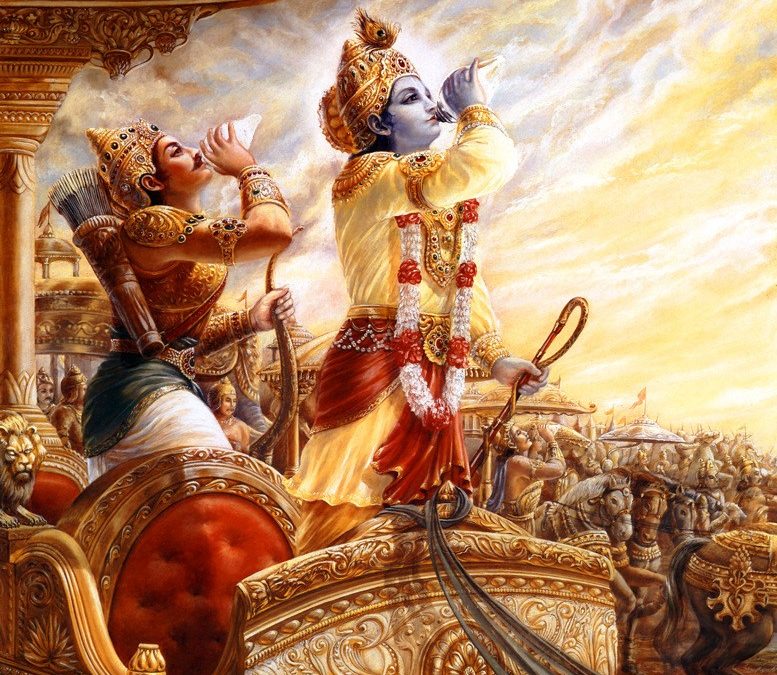Lord Krishna and the Bhagavad Gita have intrigued and compelled the Indian mind for centuries. Today it continues to inspire millions of people across the world. For readers of this blog, the Bhagavad Gita, or simply, the ‘Gita,’ is one of the most important religious texts of Hinduism. It has three major themes of knowledge, action, and love.
This sacred text, containing seven hundred verses, is a dialogue between Lord Krishna and warrior Arjuna in the epic battle of Mahabharata around 3100 B.C.E. Lord Krishna imparts profound knowledge to a confused and disturbed Arjuna who faces the moral and ethical dilemma of choosing to fight for righteousness and battle his own. All Arjuna could see on the battlefield was his uncles, grandfathers, teachers, maternal uncles, brothers, sons, grandsons, and comrades. Seeing fathers-in-law, all those kinsmen, and other dear ones standing in the ranks of the two armies, this upset and confused him greatly.
In essence, the Bhagavad Gita imparts the knowledge of the Self and answers some fundamental questions of life.
Recently, one of my students asked me for advice when his business was forced to shut down during COVID-19. Luckily, it gave him an opportunity to reflect on his business operations and management of staff. He wanted to use this time to become a better leader and strategist. His priority areas were efficiency, effectiveness and effortlessness. I simply advised him to read the Bhagavad Gita. He looked at me puzzled!
I explained to him that Lord Krishna resides in the heart of all living beings. He is a charismatic leader, a manager, teacher a loyal friend and a philosopher. He taught the lessons of Bhakti (devotion), good Karma (fruit of one’s actions), compassion and courage. Krishna’s lessons are still relevant to the modern man’s thoughts and needs. The Gita ticks every box of the “modern day survival guide.” Although the script may be old, it is contemporary in its essence. Lord Krishna is the master of finesse.
I used excerpts of the Bhagavad Gita to mentor top international executives and CEOs, which I shared with my student. To me the answer is simple – we must correctly identify the principles laid out in the text and apply them appropriately to the corporate setting. Top management and business schools use it as an educational tool to inspire executives and increase productivity, confidence, motivation, and fearlessness. It expands their thoughts and brings meaningful change. These traits are necessary for successful leaders, managers, entrepreneurs, and politicians alike.
My student was intrigued and wondered how the Bhagavad Gita Model is relevant to today’s business and economic context. I smiled and quoted this excerpt:
“karmaṇy-evādhikāras te mā phaleṣhu kadāchana
mā karma-phala-hetur bhūr mā te saṅgo ’stvakarmaṇi”,
“You have the right to perform your prescribed duties, but they do not entitle you to the fruits of your actions. Never consider yourself to be the cause of the result of your activities, nor be attached to inaction” (BG:2.47).
Nearly every school child in India is taught this well-known verse of the Gita. It teaches from a young age, the proper spirit of work or Karm Yog (art of action). It offers four distinct instructions regarding the science of work: 1) Do your duty, but do not concern yourself with the results, 2) The fruit of your actions are not for your enjoyment, 3) Even while working, give up the pride of doership and 4) Do not be attached to inaction.
The following are some management strategies, principles, and skills that Lord Krishna shared with warrior arjuna on the battlefield of Kurukshetra.
Master the Mind and you Master the World
“One must elevate – and not degrade oneself by one’s own mind. The mind is one’s friend and one’s enemy. The mind is the friend of those who have control over it, and the mind acts like an enemy for those who do not control it” (BG:6.05-06).
Here, Lord Krishna is sharing the importance of mastering one’s mind to the great warrior Arjuna. Our biggest enemy in the world is an uncontrolled mind. We can achieve a lot if we use wisdom and intellect to progress ourselves. James Allen, a philosopher said, “Self-control is strength, right thought is mastery, and calmness is power.” Only when the mind is mastered, a manager or leader can provide right direction with firm determination.
Focus the Mind
“Therefore, fix your mind on Me and let your intellect concentrate upon Me alone through meditation and contemplation. Thereafter, you shall certainly attain Me” (BG:12.08).
The dialogue demonstrates further the importance of a focused mind that Lord Krishna tries to instill onto Arjuna. Swami Vivekananda once said, “The powers of the mind are like the rays of the sun. When they are concentrated, they illuminate.” When the mind is focused, it can achieve what a disturbed mind cannot accomplish due to disturbance and noise. A focused mind has high problem-solving abilities and decision-making skills. In a business setting, it is highly beneficial for a manager to have a focused mind to achieve organizational objectives effectively and efficiently.
Distribute Profits to Employees and Contribute towards Society
“The righteous who eat after sharing with others are freed from all sins, but the impious who cook food only for themselves (without offering it first to God or sharing with others), in truth, eat sin” (BG:3.13).
Lord Krishna is suggesting the importance of the habit of sharing with society. Most businesses and corporations consume the resources of the society. We must therefore heighten our awareness to contribute back for the welfare of all. An offering made by a millionaire and a poor man is considered the same, if it is done with humility. It is suggested that business profits must be distributed to employees to give them a sense of being valued, worthy and appreciated.
Be a Leader and Provide Right Motivation
“The wise should not unsettle the minds of the ignorant who are attached to the fruits of work but should inspire others by performing their duty efficiently with dedication and without selfish attachment” (BG:3.26).
There is a direct correlation between an employees’ level of motivation and productivity. Employees need motivating factors to remain committed and productive. At times, they need to be managed, advised and guided in the right direction. Lord Krishna showed the great warrior Arjuna the right direction, in the scenario above. As it is famously quoted by Mahatma Gandhi, “be the change you wish to see in the world.” Similarly, a manager should ensure that they are the leader, motivator and guide for the workforce to achieve objectives of the organization.
Be Action Oriented
“O warrior Arjuna, there is nothing in the three worlds – heaven, earth, and the lower regions – that should be done by Me, nor there is anything unobtained that I should obtain, yet I engage in action” (BG: 3.22).
Here, Lord Krishna is highlighting the significance of being action oriented. I often say that your actions become your habits, habits become your values, and values become your destiny. This means that our actions have a direct impact on shaping our destiny. To achieve the desired result, we must combine our knowledge with the necessary action to attain those results. One should always let actions speak louder than words, for actions are worthier.
Hold Firm and be Strong even in Adversity
“Considering also your duty as a warrior, you should not waver because there is nothing more auspicious than one’s personal duty in life” (BG:2.31).
Here, the importance of facing adverse situations with firmness and determination is communicated to warrior Arjuna. We face both turbulent and smooth periods in our lives. Similarly, in business one must remain focused in both favourable and unfavourable situations. A manager should make a suitable strategy to prepare for any eventualities. Currently we face unprecedented challenges. If we apply the principles that Lord Krishna has shared with the world, a manager or leader can face even the most arduous times with firmness. Nothing can stop them from achieving organizational objectives even during adversity.
Act with Conviction
“Whatever is done without faith – whether it is sacrifice, charity, austerity, or any other act – is useless. It has no value here or hereafter, O Warrior Arjuna” (BG: 17.28).
Lord Krishna is emphasizing action with truthful conviction and the significance of belief in everything we do. Leaders must believe in an action before undertaking them. Half-hearted attempts will not get us the desired result. Therefore, it is necessary for managers to give their best so that their team members can make meaningful contributions.
Achieve your Dream
“That resolve is in the mode of ignorance by which a dull person does not give up sleep, fear, grief, despair and false pride, O Warrior Arjuna” (BG: 18.35).
Lord Krishna is explaining here the meaning of having dreams. All individuals have aspirations that come from dreams. Former President of India, Dr. A.P.J. Abdul Kalam Sir, once said, “Dream is not that which you see while sleeping, it is something that does not let you sleep.” The beauty in dreams make life beautiful and worth living. They motivate us to achieve life goals.
As you can see, the Bhagavad Gita contains words of wisdom through practical teaching that can be easily applied to present-day situations to solve any problem. This sacred text crosses all boundaries of religion and race, containing divine wisdom and direction for all of us.
Lord Krishna’s life is a model that people have applied for many centuries. I believe it will be used for many generations to come. His teachings go beyond infinity.

